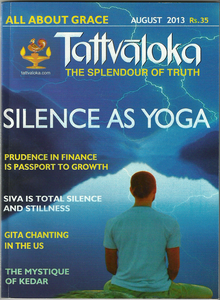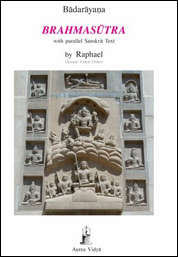[Love thoughts]… dissolve the belief systems that had created the false knowledge, in particular the arrogant belief, “I know something, I know things”. All I know is, “I am” and “There is something rather than nothing”. That’s all we know and all we can know; the rest is speculation. (p. 29)
Before its encounter with the truth, the old belief system was standing proudly on the beach, pretending to be a castle. Now it is only sand, waiting to be washed away by the wave of truth bearing down on it. (p. 98)
‘Truth Love Beauty’, Francis Lucille.
Monthly Archives: August 2014
Vedanta the Solution – Part 10
VEDĀNTA the solution to our fundamental problem by D. Venugopal
Part 10 looks at how pramANa-s work and why Vedanta acts as a pramANa for Self-knowledge.
There is a complete Contents List, to which links are added as each new part appears.
upadesha sAhasrI – Part 21
Part 21 of the serialization of the presentation (compiled by R. B. Athreya from the lectures given by Swami Paramarthananda) of upadesha sAhasrI. This is the prakaraNa grantha which is agreed by most experts to have been written by Shankara himself and is an elaborate unfoldment of the essence of Advaita.
Subscribers to Advaita Vision are also offered special rates on the journal and on books published by Tattvaloka. See the full introduction
The only certain knowledge
“Whatever knowledge we may obtain about anything other than ourself is indirect and therefore open to doubt. The only knowledge that is direct is the knowledge or consciousness that we have of ourself as ‘I am’, and hence it alone can be certain and free of all doubt.
Before we know anything else, we first know our own existence as ‘I am’. This knowledge or consciousness of ourself is our primary and essential form of knowledge. Without knowing ‘I am’ we could not know anything else. Our consciousness ‘I am’ can stand alone without any other knowledge, as we experience daily in deep sleep, but no other knowledge can stand without this consciousness ‘I am’.
. . . . . .
Only when we attain true knowledge of our consciousness ‘I am’ will we be in a position to judge the truth and validity of all our other knowledge. Thus the belief that objective research can lead to true knowledge – a belief that is implicit in and central to the philosophy upon which all modern science is based – is philosophically unsound, and is based more upon wishful thinking than upon any deep or honest philosophical analysis.
All objective knowledge is known by us indirectly through the imperfect media of our mind and five senses, whereas consciousness is known by us directly as our own self. Therefore, if we seek true, clear and immediate knowledge, rather than attempting to elaborate our knowledge of objective phenomena by turning our attention outwards through our mind and five senses, we should attempt to refine our knowledge of consciousness by directing our attention selfwards, towards the essential consciousness that we always experience directly as ‘I am'”
From Happiness and the Art of Being, Michael James, Trafford.
ISBN: 978-1-4251-2465-6
Extract Link
Review Link
Buy from Amazon US, Buy from Amazon UK
The Absence of Belief
Quote
“I would define a ‘true sage’ conceptually as a human organism in which the sense of separation as the author of their actions is gone. It is a human being for whom the belief – and it is a false belief – that they are the centers of the universe, the authors of their thoughts and their feelings and their actions – that belief is absent in a True Sage.
And this is not a belief on the part of the human organism that they are not the authors of their action, it is the absence of the belief that they are. So it is not the presence of the belief that they are not, but the absence of the belief that they are. There are a lot of people running around with the belief that they are not the authors of their action and that belief is simply another belief.”
Wayne Liquorman
Book Extract – Brahmasūtra
Extract: Realization of Brahman from the new book by Raphael.
Raphael comments on 5 sutras from Bādarāyaṇa’s Brahmasūtra, which address the realization of Brahman and its identity with Atman. These extracts begin with the teaching of neti, neti.
3.2.23. That [Brahman] is unmanifest, for this is what [the Śruti] states.
Whose Story are You Living?
There seem to be a lot of churches on Maui. The missionaries did a very thorough job here. As I drive around I often see a cryptic message posted on a sign board outside a church. Little sayings that I suppose are meant to bring one back into the fold.
When I see these messages I often try and look at them from the understanding I now have about the nature of reality and the way the world functions as a whole.
Here is one saying that I pass quite often posted outside a Baptist Church. “Whose story are you living, God’s or yours?
Continue reading
Belief versus Faith pending understanding
sraddha kidrsi? guruvedantavakyesu visvasaha sraddha
Of what nature is sraddha? Trust in the words of the teacher and Vedanta is sraddha.
Quoting from Swami Dayananda’s commentary on the above verse from Tattvabodha:
Visvasa is trust, faith, in the words of Vedanta, vedanta-vakyesu. What is that trust here? That they are a pramana, a means of knowledge. You give the status of pramana to the words of Vedanta. You do not look at them as theory, speculation or philosophy, but take them as words that are an independent means of knowledge. That is called visvasa.”
Dhanya’s thoughts:
This type of faith is considered to be one of the qualifications for the gain of self-knowledge. There is a beautiful saying in the Bhagavad Gita that Swamiji quotes a lot ‘shraddhavan labhate jnanam.’ (Chapter 4, verse 39). Continue reading
What is Brahman? (Part 1)
 Enlightenment is the realization in the mind of a person that ‘I am Brahman’. So what is this ‘Brahman’ that I am supposed to realize? Knowing this must constitute a significant aspect of the Self-knowledge that I need to acquire in order to become enlightened.
Enlightenment is the realization in the mind of a person that ‘I am Brahman’. So what is this ‘Brahman’ that I am supposed to realize? Knowing this must constitute a significant aspect of the Self-knowledge that I need to acquire in order to become enlightened.
(The following analysis is loosely based upon Swami Paramarthananda’s talks on Shankara’s bhAShya [analytical commentary] on the Brahma Sutra.)
Before we can investigate anything, two criteria must be satisfied:
1) We must know what it is we are investigating (a definition)
2) We must have an appropriate means of acquiring data (a pramANa). Continue reading
There are no beliefs here
I’ve heard that in the sage, everything happens spontaneously.
Yes. And do you want to know what else? In everyone, everything happens spontaneously. In you, everything happens spontaneously.
I don’t experience it like that.
Exactly. That’s the difference.
Do you believe that the Understanding can happen to anyone?
I don’t believe anything.
What?
There are no beliefs here.
That’s an extraordinary statement.
Not at all. It’s really quite simple. You either know something or you don’t. If you know something, you don’t have to believe it’s true or have faith that it’s true; you know it beyond doubt, it simply is, and there’s no belief involved. On the other hand if you don’t know something, the honest thing is to simply say you don’t know. But of course there are many psychological and political and social reason why people can’t admit, even to themselves, that they don’t know something, so they create a belief; which is essentially saying that you don’t really know something is true, but you’re going to pretend you do. It’s all activity in the dream. There’s really only one thing which is not of the dream, only one thing that can be known, and that is the basic consciousness, “I Am.” Everything else is just a concept, a construct of mind in the dream, something “I don’t know.” Everything.
Okay, but can this Understanding happen to anyone, any body/mind?
Of course.
Could it happen to me?
No, of course not. That’s the difference. But it could happen in the case of the body/mind organism which at the moment you think is you, and then there would be the understanding that there never was a ‘you,’ a ‘me’ for anything to happen to, and that who You are is the Consciousness in which all this appears to happen. The Understanding and the belief in a ‘me’ are mutually exclusive: if one is there the other will not be.
From ‘Perfect Brilliant Stillness’, David Carse, Non-Duality Press, ISBN: 954779282.
Extract Link, Review Link
Buy from Amazon US, Buy from Amazon UK



